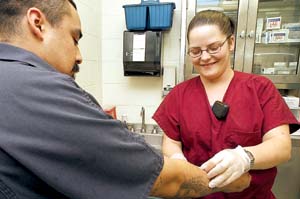Medical costs are one of San Benito County Jail’s biggest
expenses, and although a new contract increased the bill by
$150,000, the sheriff anticipates it will save taxpayers a
considerable amount of money in the long run.
Hollister – Medical costs are one of San Benito County Jail’s biggest expenses, and although a new contract increased the bill by $150,000, the sheriff anticipates it will save taxpayers a considerable amount of money in the long run.
The Sheriff’s Department signed a $631,000 contract with Monterey-based independent contractor California Forensic Medical Group, Inc. in July.
A report issued last week by the San Benito County Grand Jury that reviewed the costs before the new contract was instated called the costs “catastrophic,” however made no recommendations to alleviate them.
Sheriff Curtis Hill hopes that the new contract, although more expensive at the onset, will mitigate the jurors concerns.
The department previously contracted with Hazel Hawkins Hospital, but Hill switched over to the more expensive contract because it is all-inclusive for the jail and juvenile hall, covers both medical and dental and allows for medical personnel to be on-site seven days a week, Hill said.
The previous contract is in storage at the San Benito County Administration Building and the costs of the contract could not be obtained by press time.
Previously the department had separate contracts for both facilities and for dental coverage, and did not have any personnel available on the weekends, Hill said.
“We added two more days that a nurse will be inside the facility providing for basic medical treatment verses loading an (inmate) up, taking them to the ER and paying full-list price,” Hill said. “My policy is that we are going to provide the minimum standard under (the law). There’s no fluff.”
Hill said many agencies exceed the minimum standards for medical treatment, but he’s not willing to take extra money out of taxpayer pockets to treat inmates.
For example, if an inmate had a medical condition that required physical therapy and they were scheduled to be released in 10 days, Hill said he would wait on that treatment until the inmate was released and could pay for it themselves.
“We’re constantly tweaking things in an attempt to save money for taxpayers,” he said. “We’ve even gone to the Board (of Supervisors) and asked to release an inmate so they can seek their own medical attention so taxpayers don’t get stuck with their medical costs.”
The Board approved the contract because it felt the new contract would be financially advantageous in the long-run, and it eliminated the hassle of dealing with multiple contracts for the correction facility, said Supervisor Reb Monaco.
“There was merit to using that service,” Monaco said. “Sheriff Hill presented it and he had researched the information, so it seemed like a good deal.”
The minimum standards for inmate care under the new contract include screening for tuberculosis and other communicable diseases of all inmates who reside in the adult facility within 14 days of their incarceration, and performing a physical on every minor who is admitted to Juvenile Hall within 96 hours of admission, according to the contract.
A registered nurse is available seven days a week to respond to any sick calls and a physician will provide consultation at least once a week and be on-call 24 hours every day for Juvenile Hall, according to the contract.
Hill said that although it’s too early to determine exact numbers, he anticipates there will be a net savings from the new contract based on personnel being on-site for an extra 16 hours on the weekend.
He’s already received a bill for $34,000 from the emergency room of billings for inmate care before the new contract went into affect on July 1, he said.
“It’s a huge, huge issue for every county jail,” Hill said.










